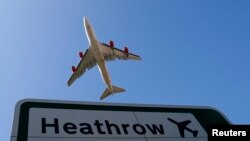Allowing children as young as 12 to use electronic passport gates at British airports would be a missed opportunity to identify victims of child trafficking, anti-trafficking campaigners said.
The U.K. Home Office (interior ministry) has started a six-month trial of eGates, which use facial recognition technology, for children 12-17 years old at five major U.K. airports, including the country's biggest airports, Heathrow and Gatwick.
The electronic gates, which can be used by any citizen of the 31 European Economic Area (EEA) countries and Switzerland who holds an electronic passport, have until now been available only for travelers of 18 and above.
Campaigners said on Wednesday that letting children enter Britain without facing a trained passport officer able to spot "very subtle" changes in behavior would be a missed opportunity to spot victims.
"Removing the human interaction could mean that fewer victims of trafficking are identified at borders," Chloe Setter, head of advocacy, policy and campaigns at the anti-child exploitation, pornography and trafficking organization ECPAT UK, told the Thomson Reuters Foundation.
"Nothing can quite replace the direct human interaction of a person speaking to another person, looking at their passport and asking questions," Setter said in a phone interview. The Home Office said trained officers would be posted ahead of the eGates to stop those they wanted to question further.
"Border Force considered a range of factors when developing this pilot - including how best to ensure the safety of children taking part and how to mitigate against the risk of trafficking in line with our child safeguarding responsibilities," the Home Office said in a statement.
It said the U.K. was following other countries, including Australia, Finland and New Zealand, where children of 12 and above were able to use electronic gates at airports.
Jakub Sobik, press officer of London-based rights group Anti-Slavery International, said letting children use eGates would make it easier for traffickers to bring children into Britain.
"It sounds like it would increase the trafficking risk quite a lot," he said in a phone interview.
Setter said that ... children who were being trafficked occasionally sought help at airports by getting the attention of officers who checked their documents.
"It could be a really missed opportunity if they don't have that chance," Setter said.
The number of people identified as potential trafficking victims in Britain rose by 21 percent in 2014 to 3,309 - about one-fifth of them children, according to the National Crime Agency.
The government, which estimates that up to 13,000 people in Britain are victims of slavery, passed anti-slavery laws last year amid concern that not enough was being done to stop the practice, which affects tens of millions of people worldwide.





